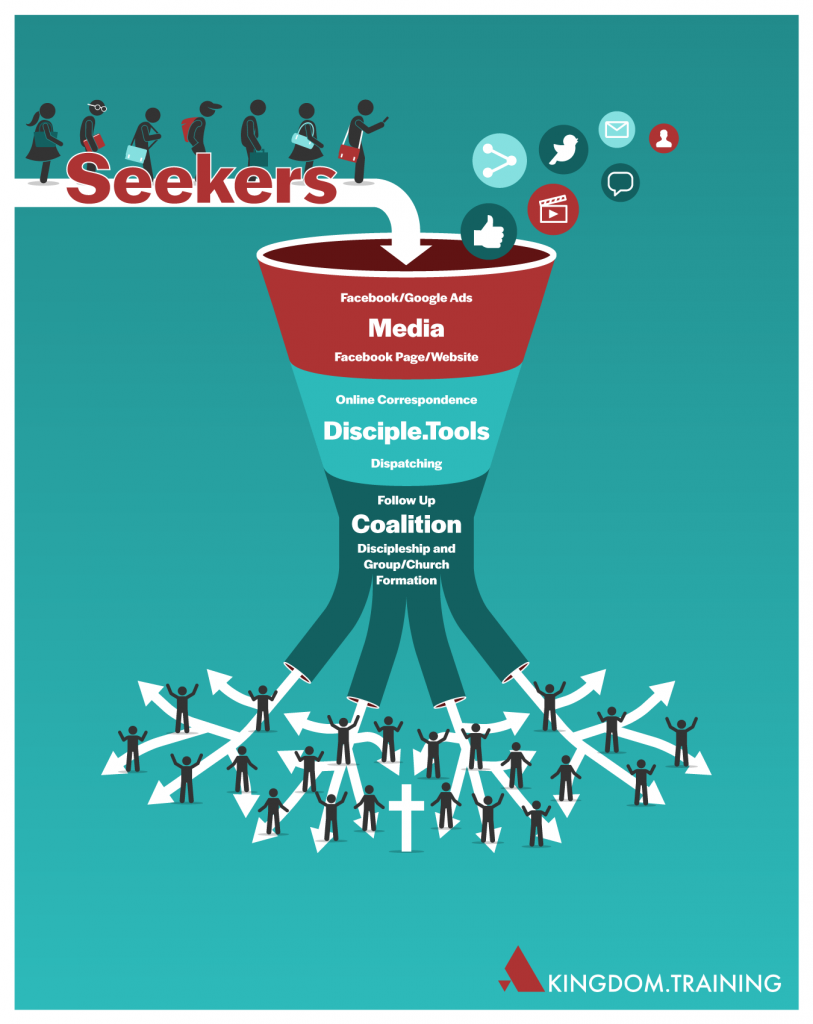
Best Practices for Digital Filterers Searching for People of Peace
In most Media to Disciple Making Movement (M2DMM) efforts, the Digital Filterer is the first person to begin the process of filtering for Persons of Peace (POPs) among media contacts. The following tips were gathered by a group of M2DMM practitioners in North Africa and the Middle East to train Digital Filterers.
General Descriptions of a Person of Peace
- A POP is hospitable, welcoming, willing to feed and lodge the carrier of the Gospel message (Luke 10:7, Matthew 10:11). In the digital realm, this might look like a POP offering to serve the page in some way or being open to relationship.
- A POP opens their oikos (Greek word for household) to the Gospel message (Luke 10:5). They have the ability to introduce others to their sphere of influence (Acts 10:33, John 4:29, Mark 5:20). In the digital realm, this might look like the POP sharing what they learn with others online.
- A POP listens to the Digital Filterer and receives the peace he/she extends (Luke 10:6). They know the Digital Filterer is a follower of Jesus but they do not reject him/her, thus showing their willingness to listen to Jesus (Luke 10:16, Matthew 10:14). A POP is willing to look into the Scriptures with a curious spirit (Acts 8:30-31). In the digital realm, this might look the POP expressing interest in the life the Digital Filterer leads as a follower of Jesus.
- A POP is a person of reputation (could be good or bad) in the community. Biblical examples are Cornelius, the woman at the well (John 4), Lydia, the demoniac in Mark 5, the Ethiopian eunuch, and the Philippian jailer. Even in the digital realm, a Digital Filterer can sometimes discern how influential a person is.
- A POP is open to spiritual conversations. They respond with spiritual statements (Acts 8:34, Luke 4:15) and are hungry for spiritual answers to their deepest questions (John 4:15).
- A POP asks questions. They don’t just tell their opinion, they want to know the Digital Filterer’s as well (Acts 16:30).
- A POP will respond to the Digital Filterer’s invitation to learn directly from God’s Word (Acts 8:31).
Effective Digital Filtering Strategies for Finding a Person of Peace
Searching for POPs is an important distinctive in M2DMM strategies from other social media efforts . The Digital Filterer should focus on sharers instead of seekers, spending more time and effort on those who are passing on what they are learning to their friends and family. One of the keys to discerning if someone is a POP is by listening first to them. “Why did you click to send us a message?” Find out about any disillusionment the POP might have with their own or their culture’s beliefs/religion/situation. It might be difficult to determine if someone is a leader or influencer, but a good way to filter is by using questions to emphasize the importance of groups early in the conversation. Examples of helpful questions:
- Who can you study the Word with?
- Who else needs to learn what you are learning?
- If they don’t understand something, suggest they may understand it if they studied it with others. After they do, ask how did it go?
- What did you and your brother/friend learn about God together?
- What things did you learn in the story that will change your family or friendship?
Give respect to the POP by listening to them. Show a willingness to learn from the POP, first. A female Digital Filterer in North Africa described how she sometimes initially defers to men in a culturally appropriate way in chats and allows them to ‘lead’ the conversation. Allowing a POP (male or female) to lead will give the Digital Filterer an idea if the person has the skills to be a leader and a guide for others. Some M2DMM teams have found it fruitful to make efforts to determine if a contact has POP characteristics before determining how open or spiritually hungry they are. As the POP’s interest and questions grow about Jesus, the Digital Filterer can talk about helping the POP start their own group. A good Digital Filterer wants to empower the POP to lead.
As the Digital Filterer proclaims the Kingdom (Matthew 10:7), let the POP catch the vision to change his/her family, friend group, and country. Help the POP learn to hear from God by encouraging him/her to ask God, “What should my role be in making this vision of the Kingdom a reality?” Examples of questions:
- What would it look like if everyone loved each other the way that God loves?
- What would change if we all followed the teachings of Jesus?
- What would your neighborhood looked like if people actually obeyed God’s command to…?
Time matters, and replying quickly to POPs is essential. If a POP expresses interest in sharing what they’re learning be prepared to send them a story set, perhaps a topical Discovery Bible Study, and encourage them to study it with someone else. Make sure to consider if the person needs an .MP3 audio file or a .PDF with the story and questions. Try to make the story set topical in step with recent conversations (e.g. prayer, marriage, holy living, power encounters, heaven). Follow up with the person and ask how their group answered the questions.
If the Digital Filterer is not the face-to-face Multiplier, make sure to create and manage appropriate expectations for the POP. As Digital Filterers continue to grow in experience in finding POPs, it is important to bring them together with Multipliers (those who meet face-to-face with the POPs). It allows for both the Digital Filterer and the Multiplier to grow as they share stories of how POPs in the online environment, did or did not pan out in real life.
What not to talk about
Most of this article addresses what to do to find POPs, here are a few tips on what to avoid as a Digital Filterer looks for POPs:
- Don’t talk about religion. Don’t quickly introduce religious words that may have baggage and may be misunderstood.
- Don’t debate. Examples of questions that prompt debates are “Is the Bible corrupted?” and “Can you explain the Trinity?”
Digital Filterers who are looking for POPs learn how to ignore these questions and turn them back to Jesus. Prepare answers to common questions and continue to discern between those who just want to argue and those who are genuine and may just need help to move past common stumbling blocks. There are two key signs that a person is not a POP:
- The person does not commit to following Jesus.
- The person wants to learn, but doesn’t want to share what they learn with others.
Like all roles in a M2DMM effort, practice and feedback are vital for growth. When on-boarding a Digital Filterer consider the value of role-playing conversations and giving real-time coaching as a Digital Filterer engages with online seekers.
In conclusion, Digital Filterers understand that they must walk in step with the Holy Spirit. He is the one who awakens POPs to the truth. Digital Filterers should prayerfully expect God to draw people to Himself. Likewise, the M2DMM team should cover their Digital Filterer in prayer. The Digital Filterer often receives ugly, raunchy, and evil comments in the social media realm. Pray diligently for spiritual protection, discernment, and wisdom.
More Resources:
- Learn more about the Digital Filterer Role
- Christian Media Marketing Podcast by Jon Ralls: Episode 43 Digital Responders Advanced Training
- Digital Filterers Training Download


Pingback: Digital Responder : What is this role? What do they do?